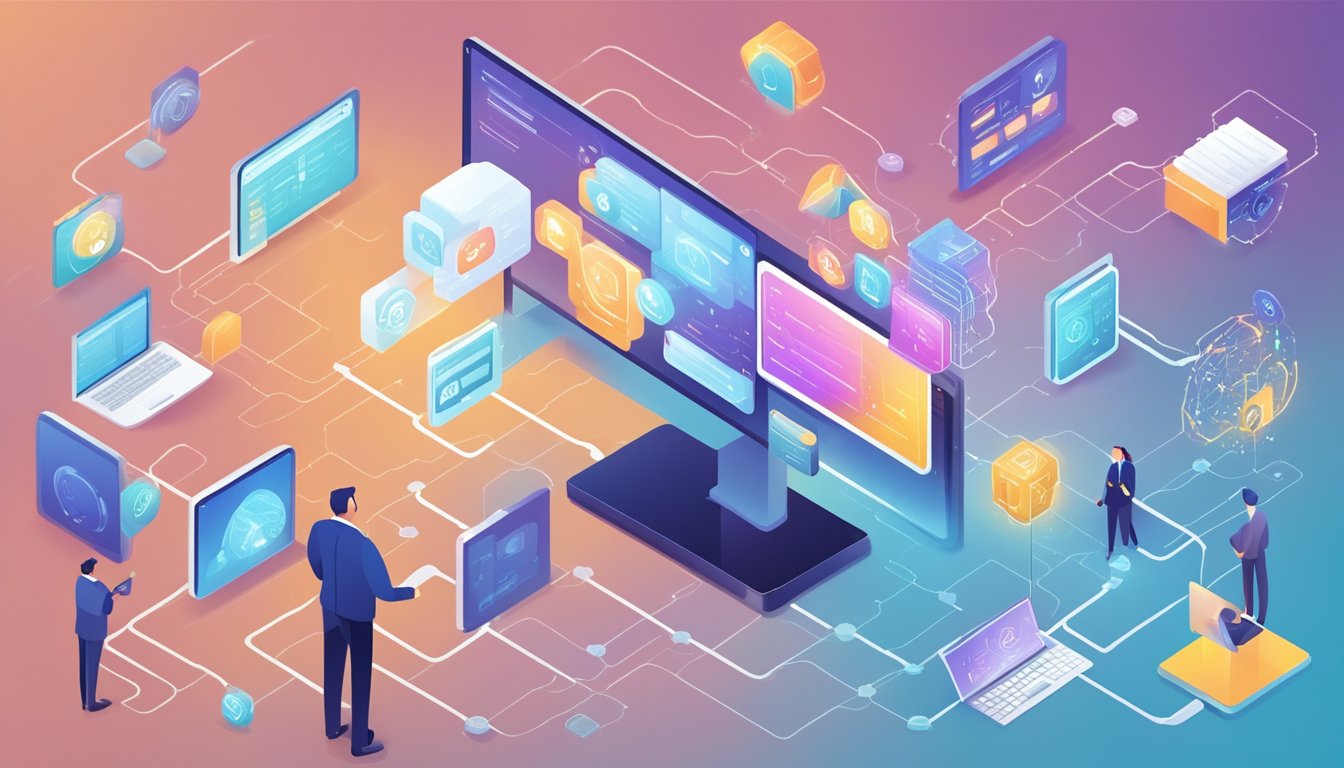Integrating AI with Your Business Management System: A Streamlined Strategy
Have you ever considered artificial intelligence as a partner rather than just a tool in your business management system? Imagine AI not just streamlining your processes but also unlocking potential you didn’t even know existed. It’s not the stuff of science fiction anymore; businesses across industries are harnessing AI to enhance their decision-making, automate routine tasks, and personalize customer experiences.

Are you ready to give your business that cutting-edge advantage? Incorporating AI technology into your business isn’t just about staying ahead of the curve; it’s becoming a necessity in a world where speed and efficiency are paramount. But how exactly does AI fit into the equation? It’s simpler than you might think. Tools such as AI-powered analytics can process vast amounts of data to provide insights that help you fine-tune your marketing strategy, while AI chatbots can take customer service to a whole new level.
However, the journey to integrate AI into your business management systems does require careful planning. You’ll need to get familiar with what AI can do and identify the right tools and technologies that align with your business goals. Starting small with specific tasks like automating customer support emails can lead to more significant changes in how you handle data, build workflows, and engage with your customers. The potential is immense, and with the right approach, AI can be the secret sauce that propels your business into a more efficient, innovative future.
Understanding AI and Its Impact on Businesses
Have you ever wondered how artificial intelligence (AI) is causing ripples across the vast ocean of business development? It’s shaping the way companies operate, compete, and thrive. Let’s explore the what and the how.
AI Fundamentals and Business Relevance
Did you know? AI isn’t about robots taking over the world; it’s about algorithms and machine learning that transform data into insights for smarter decision-making. It’s crucial you grasp these fundamentals:
- Machine Learning: AI systems learn from patterns in data, which can lead to predictive analytics and customer behavior forecasting.
- Automation: AI can automate tasks, from scheduling meetings to sorting through data, giving you more time to focus on strategic activities.
- Enhanced Data Processing: With AI, your business can process and analyze data at unprecedented speeds, revealing trends and opportunities that are easily missed by human eyes.
Businesses employing AI technologies are witnessing streamlined operations and improved efficiencies. Isn’t it about time you leveraged AI to sift through the noise and hone in on what truly matters for your business growth?
The Role of AI in Competitive Advantage
Ever feel like the marketplace is a race where you’re juggling to stay ahead? Enter AI. It’s your secret sauce to outdo competitors. Here’s why:
- Tailored Customer Experience: Imagine offering products and services that feel custom-made for each customer. With AI’s help in analyzing consumer behavior, you can do just that.
- Data-Driven Decisions: You don’t have to guess anymore. Use AI for accurate data analysis and make informed decisions that could propel your business forward.
- Innovation: Staying ahead often means being the first to introduce something new. AI can help you identify trends and innovate, ensuring that your company stays fresh and relevant.
By integrating AI into your strategic planning, you’re not just keeping up, but you’re setting the pace. Feel excited yet? Your AI-powered competitive edge might just be a few informed decisions away.
Strategies for AI Integration

When it comes to integrating AI into your business management system, the goal is to boost efficiency and sharpen decision-making. Ready to get started? Let’s map out the best route for your AI journey.
Assessing Your Business Needs
First things first, let’s figure out what your business actually needs. It’s sort of like diagnosing your car before heading to the mechanic – you need to know what’s under the hood! Start by pinpointing areas where AI could really make an impact. Could your customer service use a chatbot sidekick? Or maybe your sales predictions could be more on point with some AI insight? By understanding where AI fits, you can make smarter, data-driven decisions without shooting in the dark.
- Review your company’s workflow and processes.
- Identify bottlenecks and inefficiencies.
- Determine where AI can provide solutions.
Here’s a pro tip: don’t just guess—let the data lead you!
Developing an AI Integration Framework
Okay, you’ve figured out where AI can help. Now it’s time to build the framework that’ll turn those AI dreams into reality. This isn’t legos, so we’ll need a solid plan—something like an AI Integration Strategy. Your framework should lay out the who, what, and how of AI in your enterprise.
- Outline clear business objectives.
- Identify key players in your AI journey.
- Establish a timeline with milestones for implementation.
Building this framework is your map – it tells you where you’re going and how you’ll get there. Ready to become an AI integration trailblazer?
Technological Considerations for AI Deployment

When diving into AI deployment for your business, it’s crucial to think about the kind of tech you’ll need and how you’ll handle sensitive data. Feel like a challenge? Careful selection of AI technologies and stringent security measures aren’t just smart moves – they’re necessities.
Choosing the Right AI Technologies
So, you’re ready to pick your AI tech family, right? It’s like matchmaking for your business. You want to ensure that the AI technologies you choose are not only compatible with your existing systems but also scalable for future growth. But remember, it’s not just about the coolest gadgets on the block! Consider these factors:
- Costs: How will your budget feel about this new relationship?
- Expertise: Do you have the in-house talent to dance with this tech?
- Integration: Will your current systems welcome this newcomer?
- Scalability: Can your AI grow with you, or will it hold your ambitions back?
Addressing Data Privacy and Security
Data is the soul of your AI system, and you must protect it fiercely! Cybersecurity isn’t just an IT problem; it’s your ticket to customer trust. I bet you wouldn’t entrust your social security number to a stranger, so why should your customers? Here’s how you can shield your data fortress:
- Regulations Compliance: Are you playing by the rules, checking boxes for GDPR or CCPA?
- Access Controls: Who can get in and out of your data vault?
- Encryption: Is your data incognito, even on the move?
- Cybersecurity Frameworks: Have you considered frameworks like NIST to bulletproof your systems?
By addressing these technical and security considerations, you’re not just setting up AI; you’re crafting a future-ready, resilient business. Go you!
AI and Enhancing Customer Experiences
Have you ever wondered how your favorite brands seem to know exactly what you like? Well, Artificial Intelligence (AI) is revolutionizing the way businesses interact with you, tailoring your experience to be as smooth as silk.
Personalization through AI
Imagine walking into a store where everything on the shelf is just what you’ve been looking for. That’s the magic AI brings to your online shopping cart. Companies like Starbucks and Nike are harnessing AI to monitor your preferences and buying habits, so they can suggest products that feel like they were made just for you. This level of personalization doesn’t just make shopping enjoyable, it makes it feel personal, because it is!
Key Benefits of AI Personalization:
- Tailored Recommendations: Products you love front and center.
- Customized Marketing: Promotions and emails that match your taste.
AI-Powered Support and Services
Gone are the days of waiting in line for customer service. AI-driven chatbots and support services are at your beck and call 24/7. They’re quick, they’re efficient, and they get smarter with every interaction. These are not just time-savers; they’re enhancing the efficiency of how you get help, making sure your problems are heard and solved with lightning speed.
How AI is Changing Customer Support:
- Instant Assistance: Get help at the click of a button.
- Seamless Experience: Smooth transitions from AI to human support if needed.
Each interaction with AI not only makes your life easier but helps businesses learn how to serve you better. And isn’t that a win-win for everyone?
Operational Efficiency and Automation

Alright, let’s cut to the chase: we’re going to talk about how AI can amp up your business game by making things run smoother and faster. Ever felt bogged down by those tedious, repeat tasks? Well, you won’t much longer!
Streamlining Business Operations
Think of your business like a high-performance engine – you want every part working in perfect harmony. By integrating AI, you’re giving your operations a turbo boost. This isn’t just about keeping pace; it’s about setting the pace. AI tools sift through data, spot trends, and give you the insights that drive smart decisions. Suddenly, bottle-necks seem to vanish, and productivity climbs without you breaking a sweat.
- Insightful Decisions: Leveraging AI for predictive analysis and real-time decision-making.
- Enhanced Coordination: AI aligns different processes, ensuring they communicate and cooperate seamlessly.
Automation of Repetitive Tasks
Now, for the bread and butter of AI in business: taking the robot out of the human. With AI, tasks that used to grind your gears can be set on autopilot. We’re talking about the kind that made you say “I wish I could clone myself.” Spoiler alert: AI is your clone, handling repetitive tasks like scheduling, data entry, and inventory management with a level of precision you’ll wish you had.
- Error Reduction: AI doesn’t get sleepy or bored; it keeps precision at a constant high.
- Time Savings: Free up hours in your day as AI handles the heavy lifting of mundane tasks.
Ready to give it a shot? Remember, the name of the game is operational efficiency. It’s not just about doing things better, but also freeing you up to focus on growth, strategy, and innovation. Let the AI roll up its digital sleeves, so you can make the magic happen where it really counts.
AI in Decision Making and Analytics

When it comes to augmenting your business efficiency, the integration of AI into decision-making and analytics is a game-changer. It’s not just about the data you have but how you use it to forecast trends and make smarter decisions. Let’s dive into how AI can transform the heart of your decision-making framework.
Incorporating Predictive Analytics
Predictive analytics isn’t just a buzzword; it’s a crystal ball, gazing into the future of your business outcomes. By incorporating predictive analytics, you harness the power of AI to analyze historical data and detect patterns. This allows you to:
- Predict customer trends
- Foresee market changes
- Anticipate operational issues
Doing so helps you stay a step ahead and can dramatically alter your strategic planning for the better. For example, if you’re in retail, predictive analytics could reveal that your customers are starting to gravitate towards eco-friendly products before that shift becomes obvious.
Improving Decision-Making Processes
Now, let’s talk about improving your decision-making process. This isn’t about replacing your team with robots; it’s about enrichment. AI can:
- Provide real-time insights
- Filter out noise and focus on relevant information
- Offer recommendations based on vast data analysis
It’s like having an incredibly astute advisor on hand 24/7, one that can manage reams of data and serve up the most pertinent bits to inform your decisions. Imagine cutting down meeting times because you already have the insights you need. Data-driven decisions are no longer a luxury; they are a necessity for staying competitive.
By integrating AI into your business management system, the decision-making process evolves into a dynamic, data-driven environment. You’re not just making guesses based on past experiences; you’re making informed choices with a high degree of accuracy.
AI for Product and Service Innovation
Are you ready to give your products and services a cutting-edge twist with AI? Let’s dive into enhancing your offerings and creating unique experiences for your customers!
Enhancing Products with AI
Your products might be great, but with AI, they could be even better! Imagine integrating machine learning algorithms that personalize the user experience. Here’s the lowdown:
- Personalized Recommendations: Your customers will adore the spot-on suggestions for products tailored just for them. It’s like having a psychic salesperson!
- Quality Control: AI can scrutinize products with laser precision, spotting defects that human eyes might miss.
For instance, companies using AI have witnessed increased efficiency in product development, allowing teams to innovate rapidly and cost-effectively.
Innovative AI Services for Customers
Who doesn’t love a bit of pampering with top-notch customer service? With AI, you’re not just meeting expectations; you’re exceeding them:
- Customer Service Chatbots: Say goodbye to waiting times with AI chatbots that answer queries in a flash. They never sleep, which means your customer support just went 24/7.
- Predictive Services: AI has the uncanny ability to anticipate customer needs, suggesting services before they even think to ask.
By leveraging AI-driven tools and strategies, your product managers can unlock new opportunities for growth and innovation, creating services that resonate with your customers on a whole new level.
Managing Talent and Leadership in an AI-Driven Business
Incorporating AI into your business isn’t just about the tech—it’s about the people who make it work. Managing talent effectively and guiding leadership through the change are key to unlocking the potential of AI in your business environment.
Roles of Data Scientists and AI Specialists
Are you wondering what the heavy hitters in an AI-integrated business look like? Data scientists and AI specialists are your ace players. Their expertise allows you to harness the power of AI, turning data into business intelligence.
- Data Scientists are the maestros of data, working to extrapolate insights from a sea of information.
- They manage and analyze data to support decision-making.
- Their role evolves with AI advancements, focusing more on interpretation rather than data wrangling.
- AI Specialists focus on the development and deployment of AI models.
- They ensure that AI solutions align with business objectives.
- AI adoption often leads to new roles like AI ethicists to oversee responsible use.
Leveraging AI might shift job descriptions, but that doesn’t mean existing talent should be left behind. Upskilling your team ensures no one is left watching from the sidelines.
Leadership and Change Management
Leadership in an AI-driven business is like sailing: you need to adjust the sails to navigate the winds of change effectively. As a leader or manager, your role is paramount in steering the organization through the transformative waves of AI.
- Embrace a learning mindset—stay curious about AI and its implications for your company.
- Encourage hands-on experimentation and learning within your teams.
- Make on-going education a part of your company culture.
- Guide Change Management—be the beacon that helps your team navigate AI integration.
- Clearly communicate the benefits and changes brought by AI tools to alleviate fears and resistance.
- Recognize the emotional journey that accompanies big changes and provide support.
Inculcating leadership that is adaptive and resilient in the face of AI advancements can be a keystone for successful talent management in an AI-driven business. Remember, change can be daunting, but with the right approach, it’s also an exciting opportunity for growth. Keep your head in the game, and you’ll find that integrating AI is not just about smart machines; it’s about savvy people management too.
Frequently Asked Questions
Before you dive into the integration of AI in your business management system, you might have a few questions. Let’s get straight to what you’re curious about, shall we?
What are some real-world examples of AI enhancing business operations?
From chatbots that provide instant customer support to predictive analytics that forecast market trends, AI is transforming how companies perform. For instance, some retail giants use AI to personalize shopping experiences and optimize supply chains.
Could you share some insights on how to effectively deploy AI within existing business structures?
Sure. When it comes to deployment, it’s all about alignment with your business goals and current infrastructure. A step-by-step guide might suggest starting with identifying repetitive tasks that can be automated, then scaling up from there.
In what ways are companies leveraging AI to get ahead in their industry?
AI is the ace up the sleeve for businesses looking to outdo competitors. Firms are adopting AI to improve decision-making, accelerate R&D, and create more personalized customer experiences.
What are the initial steps a company should take to integrate AI into its management information systems?
The initial steps are crucial. Begin by reviewing your data infrastructure to ensure it’s robust enough for AI applications. Educate your team on AI capabilities, and start with a small project to demonstrate value before you go big.
How can AI tools be used to start and scale a new business venture?
AI tools can accelerate a new venture by doing a lot of the heavy lifting in data analysis and market research. They can also help in tailoring user experiences and testing out different business models quickly.
What considerations should be taken into account for successful AI implementation on company websites?
When implementing AI on your website, think about user experience and data privacy. SEO and customer engagement are improved with AI, but not without ensuring your digital ethics are on point.








